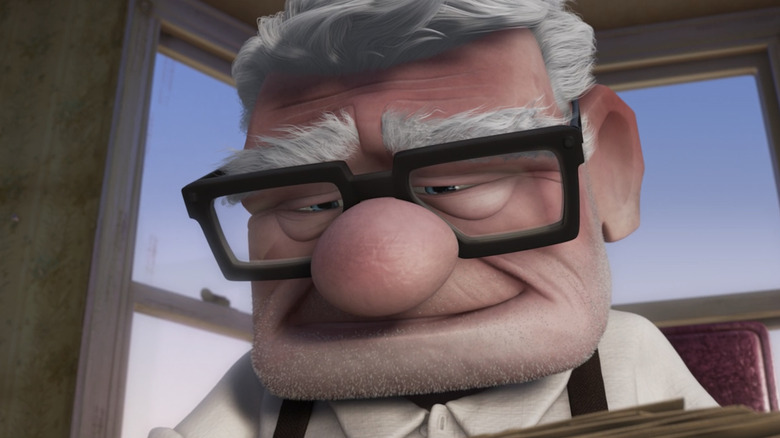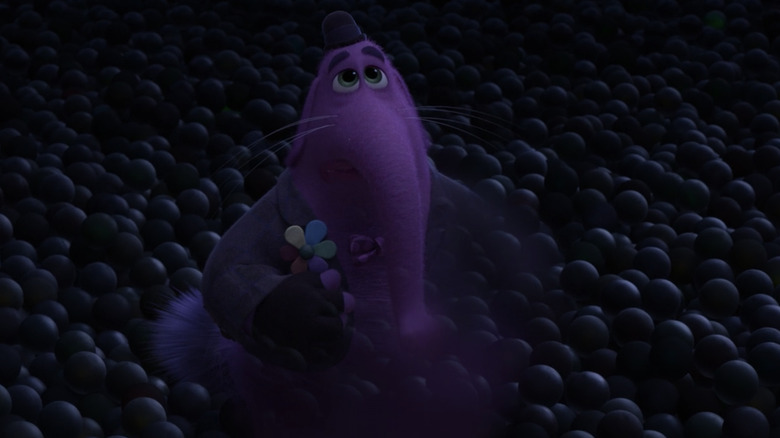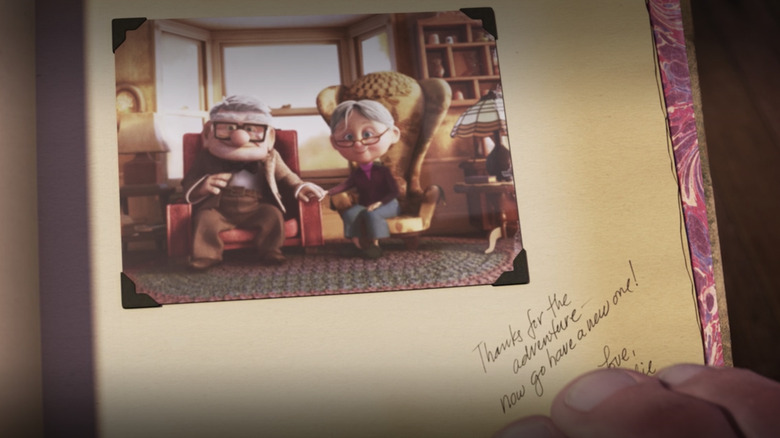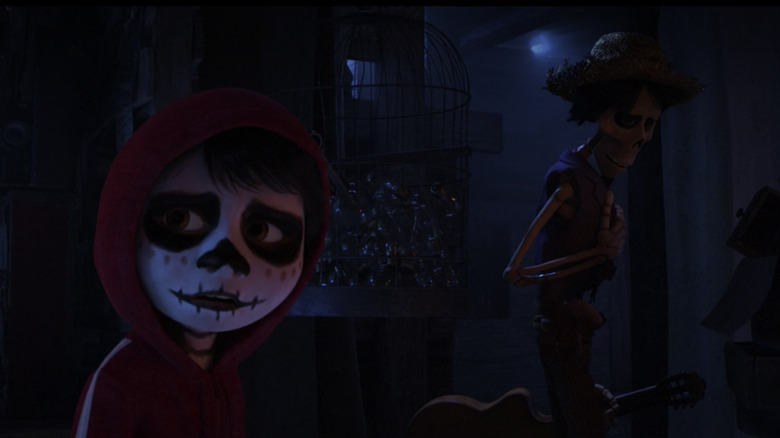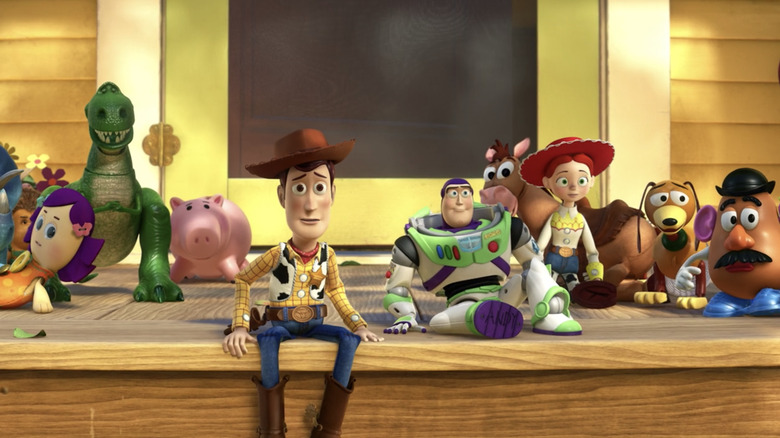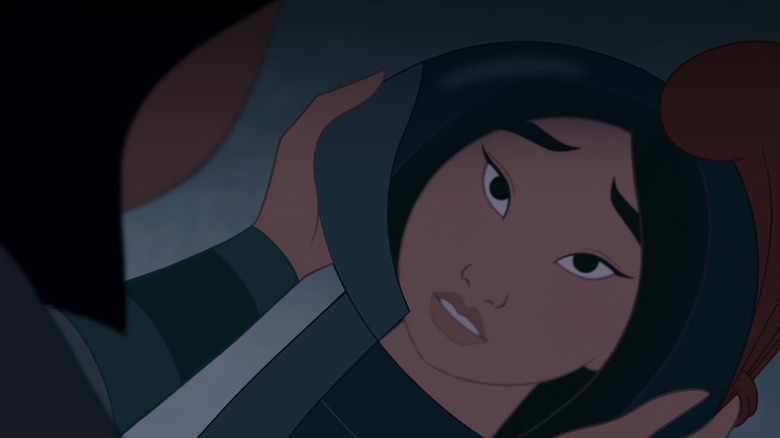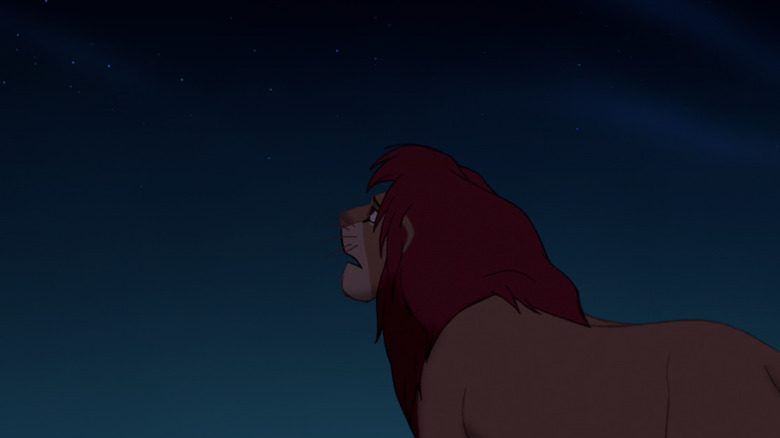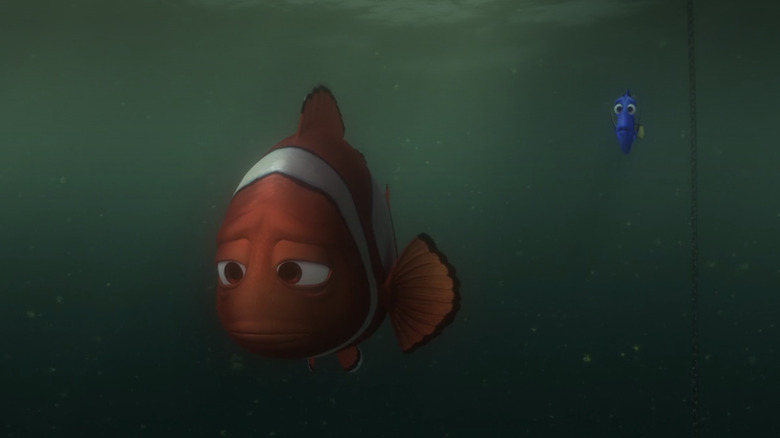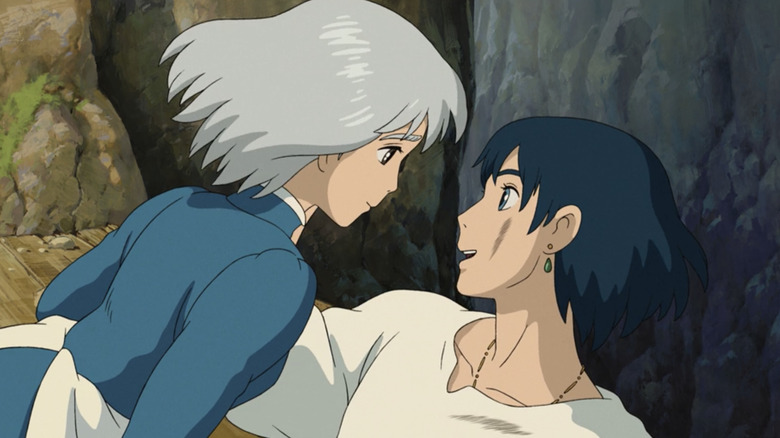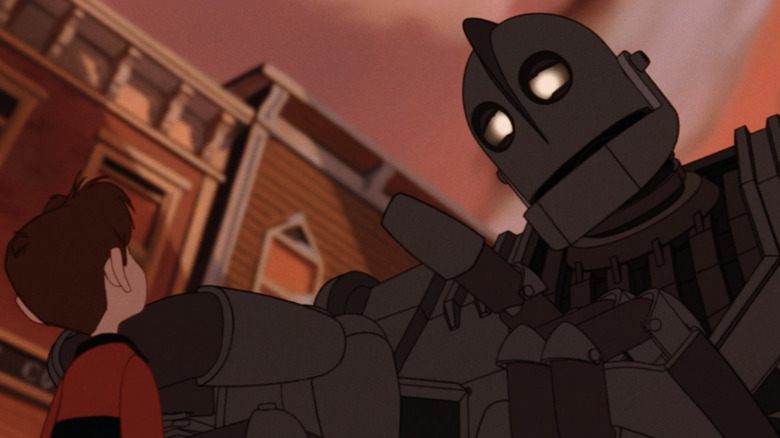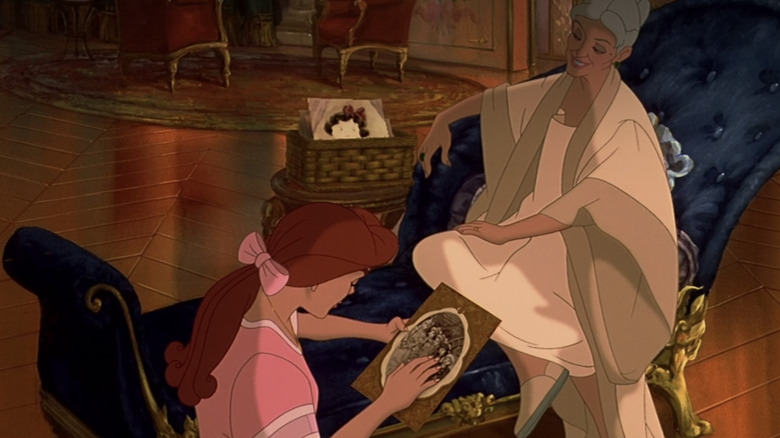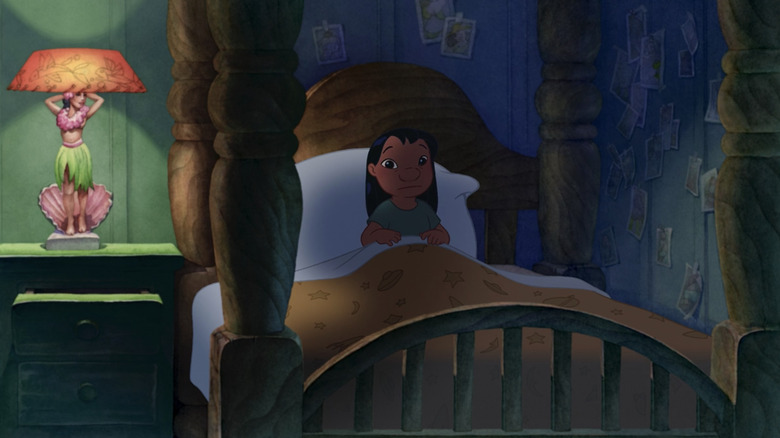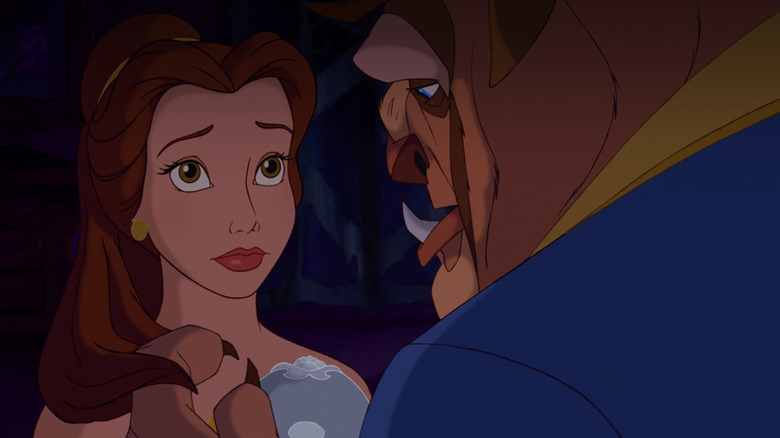The Saddest Quotes From Animated Movies
Everyone has a different threshold for sadness in movies. A scene might break one person, while another might barely react to it. However, a few cinematic moments hurt even the toughest souls. There is something unexpected about how often animated movies feature some of the saddest storylines, despite their status as childhood favorites. Even younger children can feel the painful weight of these moments, even if they aren't fully able to understand what they're feeling.
And then there are, of course, the lines that stay with viewers for years to come. Fans commemorate them with tattoos, framed artworks, and merchandise. Never underestimate the ability of an animated film to deliver tear-jerker moments through gorgeous design and evocative voice acting. In these movies, clichés are commonplace, because simplicity can be emotionally resonant with both children and adults. Animated films don't require Shakespearean prose to operate as a source of heartache: A simple quote can hit like a ton of bricks.
Bing Bong's final words to Joy
"Inside Out" tackles the concept of emotions in a way no animated film has before, and, in doing so, it forces us to examine all of the disparate parts of ourselves, even those we may have ignored for quite some time. It does this specifically with the character of "Bing Bong," Riley's long-lost imaginary friend. Even if you didn't have one growing up, the nostalgia and heartache that somehow sneak up on you are overwhelming.
The pink elephant represents the adventures that are yet to come. And so, when Bing Bong says to Joy, "take her to the moon for me, okay?" it's about ensuring that Riley will still have an opportunity to dream and enjoy life even if Bing Bong isn't there to see it. The saddest part of this quote is that symbolically it points out how life forces people to forget the glimmers of joy amidst the sadness. His final words are a way for Bing Bong to know that Joy won't allow Riley to stop using her imagination. Plus, it shows that Bing Bong never stops caring for Riley, even when she forgets him as she grows older, which makes the quote that much more poignant.
Carl reads Ellie's last note
Though this is the one quote that isn't said aloud, it still earns its place on the list as a part of "Up," Pixar's saddest film to date. After Ellie's death, her husband Carl opens her adventure book plenty of times, but he never goes past the page that reads "Stuff I'm Going to Do" — the pages they were going to fill together. But in the film's third act, right as he's about to put it away again, he notices for the first time that Ellie has already filled the pages. As we watch Carl relive the best memories of his life through Ellie's scrapbooking, the final page reads: "Thanks for the adventures, now go have a new one! Love, Ellie."
The words on the page alone are enough to make even the coldest hearts melt, but the animation dazzles at this moment as Carl's face shows so much of the catharsis he finally feels. We see the guilt lift off his shoulders because even though he and Ellie never had the time or money to do everything they planned, their marriage and life together was her greatest adventure, just as it was his. These words are the love Carl then carries with him to help Russell. As their theme, "Stuff We Did" by Michael Giacchino, plays again, the sadness comes from memories that the scrapbook evokes, the pangs of grief that resurface knowing those very adventures are now in the past.
Hector explains what happens when no one remembers a lost soul
Pixar's "Coco" is a masterpiece in every way. As a story about an old woman's tremendous loss and a little boy's inability to understand his family's shared trauma, the word "remember" alone packs a punch every time it is uttered throughout the film. With some of Pixar's most beautiful animation, "Coco" is a genuine treasure that honors Mexican heritage.
While there are some horrifically sad moments throughout "Coco," Hector explaining to Miguel what happens when a person no longer has anyone to remember them is the most gut-wrenching. "If there's no one left in the living world to remember you," he explains, "you disappear from this world." The Land of the Dead is a melancholy place, but at the very least, they still have the solace of visiting their families on Día de los Muertos (The Day of the Dead). This doesn't last forever, though. Years and years later, without a legacy that carries on, they'll simply disappear. And when you realize that Hector is terrified of this fate because Mama Coco's memory is fading, it makes it that much more heartbreaking.
Woody's last words to Andy in Toy Story III
"Toy Story 3" seems to hit the hardest for the (now-grown) kids who grew up alongside Andy. Surely, it affects others as well, but for those who went off to college at the same time as Andy, it makes "Toy Story 3" feel like an ending of sorts for them, too. And while there are countless quotes throughout the film that are truly sad — words that bring to life what growing up feels like and precisely what Andy's been through as he reflects upon them — there's no dry eye in the room after hearing Woody utter the words, "So long, partner."
The quote itself isn't sad, but Tom Hanks' delivery of the line is packed with meaning. You can feel every ounce of Woody's sadness and love for Andy in it. You can hear the pain in his voice as you realize just how much he's going to miss Andy. An animated story about toys somehow manages to highlight the perils and uncertainties of growing up. Neither Andy nor Woody will ever forget the impact they've had on each other, making the moment that much more bittersweet.
Mulan's vocalizes her insecurities
"Mulan" features one of Disney's most relatable perils — the loss of self-worth. And sure, almost every princess deals with this (to a degree), but Mulan examining her own reflection is an especially poignant examination of how she perceives herself. When nothing goes as planned after she takes her father's place in battle, Mulan voices the reason behind her actions by telling Mushu, "Maybe what I really wanted was to prove I could do things right, so when I looked in the mirror, I'd see someone worthwhile. But I was wrong. I see nothing."
The most haunting part of this quote comes from how relatable it is, because there's probably not a person in the world who hasn't looked in the mirror and felt as though they were staring at someone who wasn't enough. Or worse, feeling as though you have to prove your worth. Between this moment and Lea Salonga's "Reflection" as the film's anchors, the quote (and lyrics) have a tremendous emotional impact.
Simba yelling at Mufasa's spirit
There is no question that Disney's "The Lion King" is one of the saddest animated films, considering the impact Mufasa's death has on its young audience: No moment evokes the harrowing emptiness of grief the way Simba's cry to Mufasa does. We could argue that "Dad, c'mon, you gotta get up. We gotta go home," is the most upsetting, but something about, "You said you'd always be there for me! But you're not," evokes a desperation to talk to someone who's no longer there that adults and children alike find difficult to watch.
As one of the most dimly lit scenes throughout the entire film, this moment with Simba embodies the profound anguish of grief. It's a reflection of the darkness that is now forever in him, and Simba's loneliness and guilt are palpable in every way. There's something about watching a powerful lion cry out with so much vulnerability that reminds us that emotions don't diminish a person's strength.
Dory tells Marlin not to leave
Pixar's "Finding Nemo" is primarily about a lost clownfish, but the clear standout is Ellen DeGeneres' Dory, the Royal Blue Tang. No quote stings quite as much as Dory's, "Please don't go away. Please. No one's ever stuck with me for so long before," to Marlin. It's the kind of line that strikes both within the context of the film and externally, as viewers identify with it.
Dory's line here reflects her loss of memory, but more than that, a desperation to cling to someone who sees value in her presence. And it's the fact that she admits that no one's stuck by her side that feels like a gut punch. It encapsulates abandonment in such a way that feels utterly poignant and relatable. DeGeneres' line delivery packs immense emotion into making it clear that despite Dory's constant memory loss, this pain is one she's never been able to forget.
Sophie's words after restoring Howl's heart
While some might argue that "Howl's Moving Castle" isn't the saddest Studio Ghibli film, the immensity of the words Sophie speaks to Howl is what makes it so haunting. "A heart's a heavy burden," is a simple but powerful line. Where a kid might not understand the colossal weight of these words, as adults, it's easier for us to feel the desolation in it. We understand the notion that emotions can sometimes be a heavy cross to bear, but they are the cost of being human.
This line beautifully showcases the nature of their relationship, but above all else, it speaks to a deeper truth that we all carry within ourselves. Indescribably rich in its emotions, it is both tragic yet oddly hopeful. A heart's a heavy burden, but taking the weight of sadness and living through it displays strength. With emotions returning to Howl, his pain becomes that much more bearable as love returns to him too.
Giant's last words to Hogarth
After all these years, "The Iron Giant" is somehow still an underrated masterpiece. A large part of the film's magnificence comes from its stunning showcase of growth, undeniable heart, incredible animation work, and evocative voice acting. All of these elements combine to make the Giant's final words to Hogarth hit like a ton of bricks. It's one of the most direct quotes on this list, but the delivery and the essence of what it conveys make it an instant tearjerker. "You stay. I go. No following," followed by Hogarth's whispered, "I love you," makes for an unforgettable moment. Let's not forget that even the AFC Richmond boys in "Ted Lasso" were blubbering wrecks while watching the film in "Make Rebecca Great Again."
Vin Diesel is fantastic as the Giant while he's learning how to speak, and there is so much emotion cascading out from this single quote. The way he points to Hogarth to ensure that he understands exactly what is about to happen, while simultaneously making it clear that this is a choice he's proud to make, showcases the precious friendship between them.
Anastasia recalls how much she loved her family
The 1997 feature, "Anastasia," is a fantasy story loosely based on the Grand Duchess Anastasia Romanov, daughter of Tsar Nicholas II. However, unlike the tragic real story of the Romanovs, the animated film carries a happy ending. As one of the most dazzling animated films of its era, the heart of "Anastasia" lies in the details of romance, second chances, and forgotten memories. A song like "Once Upon A December" alone could trigger a never-ending sob fest. But it's Meg Ryan's delivery of "I remember now, how much I loved them" that hurts in all the right ways.
No matter how dark, memories are always a precious gift, and knowing that the film's version of Anastasia loses them after the cruel separation from her family makes this quote hurt because of the use of past tense, "loved." She still loves them, of course, but here she's recalling that very kind of love that she was once so desperate to find, the one she wasn't sure she'd ever get in the orphanage. It's the value of the words that illuminate why "Once Upon A December" is a melody that has always been with her, even after everything else has faded.
Lilo tells Stitch she'll remember him if he leaves
As a story about loss and acceptance in a different form, "Lilo and Stitch" is an animated feature that is likely to be easier to appreciate as people grow older. When Stitch decides to leave after conversations about Ohana meaning family, Lilo tells him: "But if you want to leave, you can. I'll remember you, though. I remember everyone that leaves." It's devastating to think that she is referring to her parents, who have both died and left her behind. Still, it becomes even more painful when you wonder how many times she must've felt abandoned to face Stitch leaving with such a melancholy perspective.
For a kid to utter these words creates an undeniably powerful moment. "Lilo and Stitch" utilizes the "found-family" trope, but more than that, it creates a story about ensuring that no one ever experiences the type of loss that Lilo knows. It's about making it clear throughout the film that she'll fight to protect anyone and anything she cares about, because that's her way of keeping a bit of home still intact.
Beast gives Belle the mirror
At its best, "Beauty and the Beast" is a story about redemption. As we experience life in the darkly enchanted castle, it's clear that for all the talking furniture and extravagant musical numbers, there is deep sadness as well. But there's something about this one specific scene where the Beast gives Belle a magical mirror so she'll always have a way to remember them all. "Take it with you so you'll always have a way to look back ... and remember me," he says with so much sadness in him, unable to believe that anyone could willingly return to him.
He can't believe someone in this world would miss him or that someone would even want to remember him. But he passes the mirror to Belle, hoping that she will be that person, because knowing that she cares to remember can give him peace of mind and comfort should he truly be in this state forever.
